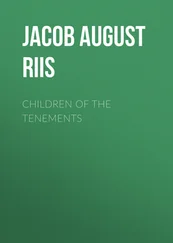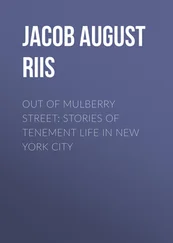Jacob August Riis - A Ten Years' War - An Account of the Battle with the Slum in New York
Здесь есть возможность читать онлайн «Jacob August Riis - A Ten Years' War - An Account of the Battle with the Slum in New York» — ознакомительный отрывок электронной книги совершенно бесплатно, а после прочтения отрывка купить полную версию. В некоторых случаях можно слушать аудио, скачать через торрент в формате fb2 и присутствует краткое содержание. Издательство: Иностранный паблик, Жанр: foreign_prose, sociology_book, foreign_antique, на английском языке. Описание произведения, (предисловие) а так же отзывы посетителей доступны на портале библиотеки ЛибКат.
- Название:A Ten Years' War: An Account of the Battle with the Slum in New York
- Автор:
- Издательство:Иностранный паблик
- Жанр:
- Год:неизвестен
- ISBN:нет данных
- Рейтинг книги:4 / 5. Голосов: 1
-
Избранное:Добавить в избранное
- Отзывы:
-
Ваша оценка:
- 80
- 1
- 2
- 3
- 4
- 5
A Ten Years' War: An Account of the Battle with the Slum in New York: краткое содержание, описание и аннотация
Предлагаем к чтению аннотацию, описание, краткое содержание или предисловие (зависит от того, что написал сам автор книги «A Ten Years' War: An Account of the Battle with the Slum in New York»). Если вы не нашли необходимую информацию о книге — напишите в комментариях, мы постараемся отыскать её.
A Ten Years' War: An Account of the Battle with the Slum in New York — читать онлайн ознакомительный отрывок
Ниже представлен текст книги, разбитый по страницам. Система сохранения места последней прочитанной страницы, позволяет с удобством читать онлайн бесплатно книгу «A Ten Years' War: An Account of the Battle with the Slum in New York», без необходимости каждый раз заново искать на чём Вы остановились. Поставьте закладку, и сможете в любой момент перейти на страницу, на которой закончили чтение.
Интервал:
Закладка:
The halls of these tenements are dark. Under the law, there should be a light burning, but it is one of the rarest things to find one. The thing seems well-nigh impossible of accomplishment. Two years ago, when the Good Government Clubs set about backing up the Board of Health in its efforts to work out this reform, which comes close to being one of the most necessary of all,—such untold mischief is abroad in the darkness of these thoroughfares,—the sanitary police reported 12,000 tenement halls unlighted by night, even, and brought them, by repeated orders, down to less than 1000 in six months. I do not believe the light burns in 1000 of them all to-day. It is so easy to put it out when the policeman's back is turned, and save the gas.
We had a curious instance at the time of the difficulties that sometimes beset reform. Certain halls that were known to be dark were reported sufficiently lighted by the policeman of the district, and it was discovered that it was his standard that was vitiated. He himself lived in a tenement, and was used to its gloom. So an order was issued defining darkness to the sanitary police: if the sink in the hall could be made out, and the slops overflowing on the floor, and if a baby could be seen on the stairs, the hall was light; if, on the other hand, the baby's shrieks were the first warning that it was being trampled upon, the hall was dark. Some days later, the old question arose about an Eldridge Street tenement. The policeman had reported the hall light enough. The president of the Board of Health, to settle it once for all, went over with me, to see for himself. The hall was very dark. He sent for the policeman.
"Did you see the sink in that hall?" he asked.
The policeman said he did.
"But it is pitch dark. How did you see it?"
"I lit a match," said the policeman.
Four families live on these floors, with Heaven knows how many children. It was here the police commissioners were requested, in sober earnest, some years ago, by a committee of very practical women philanthropists, to have the children tagged, so as to save the policemen wear and tear in taking them back and forth between the Eldridge Street police station and headquarters, when they got lost. If tagged, they could be assorted at once and taken to their homes. Incidentally, the city would save the expense of many meals. It was shrewdly suspected that the little ones were lost on purpose in a good many cases, as a way of getting them fed at the public expense.
That the children preferred the excitement of the police station, and the distinction of a trip in charge of a brass-buttoned guardian, to the Ludlow Street flat is easy enough to understand. A more unlovely existence than that in one of these tenements it would be hard to imagine. Everywhere is the stench of the kerosene stove that is forever burning, serving for cooking, heating, and ironing alike, until the last atom of oxygen is burned out of the close air. Oil is cheaper than coal. The air shaft is too busy carrying up smells from below to bring any air down, even if it is not hung full of washing in every story, as it ordinarily is. Enterprising tenants turn it to use as a refrigerator as well. There is at least a draught of air, such as it is. When fire breaks out, this draught makes of the air shaft a flue through which the fire roars fiercely to the roof, so transforming what was meant for the good of the tenants into their greatest peril. The stuffy rooms seem as if they were made for dwarfs. Most decidedly, there is not room to swing the proverbial cat in any one of them. In one I helped the children, last holiday, to set up a Christmas tree, so that a glimpse of something that was not utterly sordid and mean might for once enter their lives. Three weeks after, I found the tree standing yet in the corner. It was very cold, and there was no fire in the room. "We were going to burn it," said the little woman, whose husband was then in the insane asylum, "and then I couldn't. It looked so kind o' cheery-like there in the corner." My tree had borne the fruit I wished.
It remained for the New York slum landlord to assess the exact value of a ray of sunlight,—upon the tenant, of course. Here are two back-to-back rear tenements, with dark bedrooms on the south. The flat on the north gives upon a neighbor's yard, and a hole two feet square has been knocked in the wall, letting in air and sunlight; little enough of the latter, but what there is is carefully computed in the lease. Six dollars for this flat, six and a half for the one with the hole in the wall. Six dollars a year per ray. In half a dozen houses in this block have I found the same rate maintained. The modern tenement on the corner goes higher: for four front rooms, "where the sun comes right in your face," seventeen dollars; for the rear flat of three rooms, larger and better every other way, but always dark, like the capmaker's, eleven dollars. From the landlord's point of view, this last is probably a concession. But he is a landlord with a heart. His house is as good a one as can be built on a twenty-five-foot lot. The man who owns the corner building in Orchard Street, with the two adjoining tenements, has no heart. In the depth of last winter, I found a family of poor Jews living in a coop under his stairs, an abandoned piece of hallway, in which their baby was born, and for which he made them pay eight dollars a month. It was the most outrageous case of landlord robbery I had ever come across, and it gave me sincere pleasure to assist the sanitary policeman in curtailing his profits by even this much. The hall is not now occupied.
The Jews under the stairs had two children. The shoemaker in the cellar next door has three. They were fighting and snarling like so many dogs over the coarse food on the table before them, when we looked in. The baby, it seems, was the cause of the row. He wanted it all. He was a very dirty and a very fierce baby, and the other two children were no match for him. The shoemaker grunted fretfully at his last, "Ach, he is all de time hungry!" At the sight of the policeman, the young imp set up such a howl that we beat a hasty retreat. The cellar "flat" was undoubtedly in violation of law, but it was allowed to pass. In the main hall, on the ground floor, we counted seventeen children. The facts of life here suspend ordinary landlord prejudices to a certain extent. Occasionally it is the tenant who suspends them. The policeman laughed as he told me of the case of a mother who coveted a flat into which she well knew her family would not be admitted; the landlord was particular. She knocked, with a troubled face, alone. Yes, the flat was to let; had she any children? The woman heaved a sigh. "Six, but they are all in Greenwood." The landlord's heart was touched by such woe. He let her have the flat. By night he was amazed to find a flock of half a dozen robust youngsters domiciled under his roof. They had indeed been in Greenwood; but they had come back from the cemetery to stay. And stay they did, the rent being paid.
High rents, slack work, and low wages go hand in hand in the tenements as promoters of overcrowding. The rent is always one fourth of the family income, often more. The fierce competition for a bare living cuts down wages; and when loss of work is added, the only thing left is to take in lodgers to meet the landlord's claim. The Jew usually takes them singly, the Italian by families. The midnight visit of the sanitary policeman discloses a state of affairs against which he feels himself helpless. He has his standard: 400 cubic feet of air space for each adult sleeper, 200 for a child. That in itself is a concession to the practical necessities of the case. The original demand was for 600 feet. But of 28,000 and odd tenants canvassed in New York, in the slumming investigation prosecuted by the general government in 1894, 17,047 were found to have less than 400 feet, and of these 5526 slept in unventilated rooms with no windows. No more such rooms have been added since; but there has come that which is worse.
Читать дальшеИнтервал:
Закладка:
Похожие книги на «A Ten Years' War: An Account of the Battle with the Slum in New York»
Представляем Вашему вниманию похожие книги на «A Ten Years' War: An Account of the Battle with the Slum in New York» списком для выбора. Мы отобрали схожую по названию и смыслу литературу в надежде предоставить читателям больше вариантов отыскать новые, интересные, ещё непрочитанные произведения.
Обсуждение, отзывы о книге «A Ten Years' War: An Account of the Battle with the Slum in New York» и просто собственные мнения читателей. Оставьте ваши комментарии, напишите, что Вы думаете о произведении, его смысле или главных героях. Укажите что конкретно понравилось, а что нет, и почему Вы так считаете.












